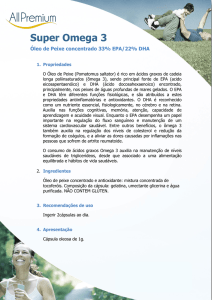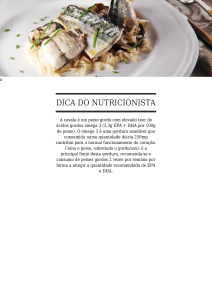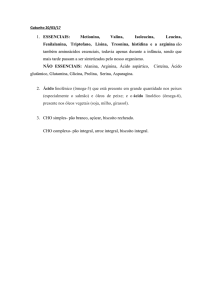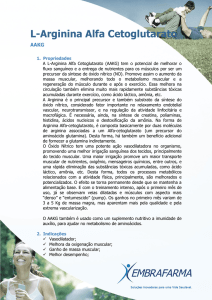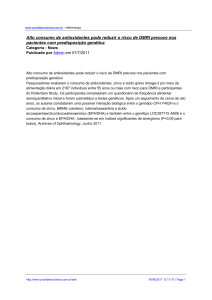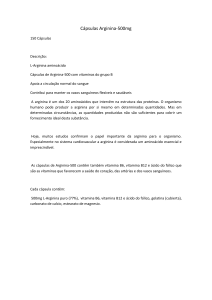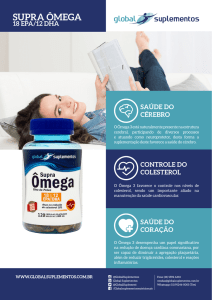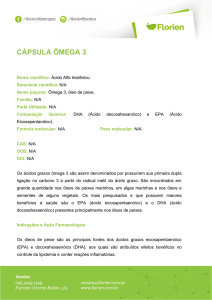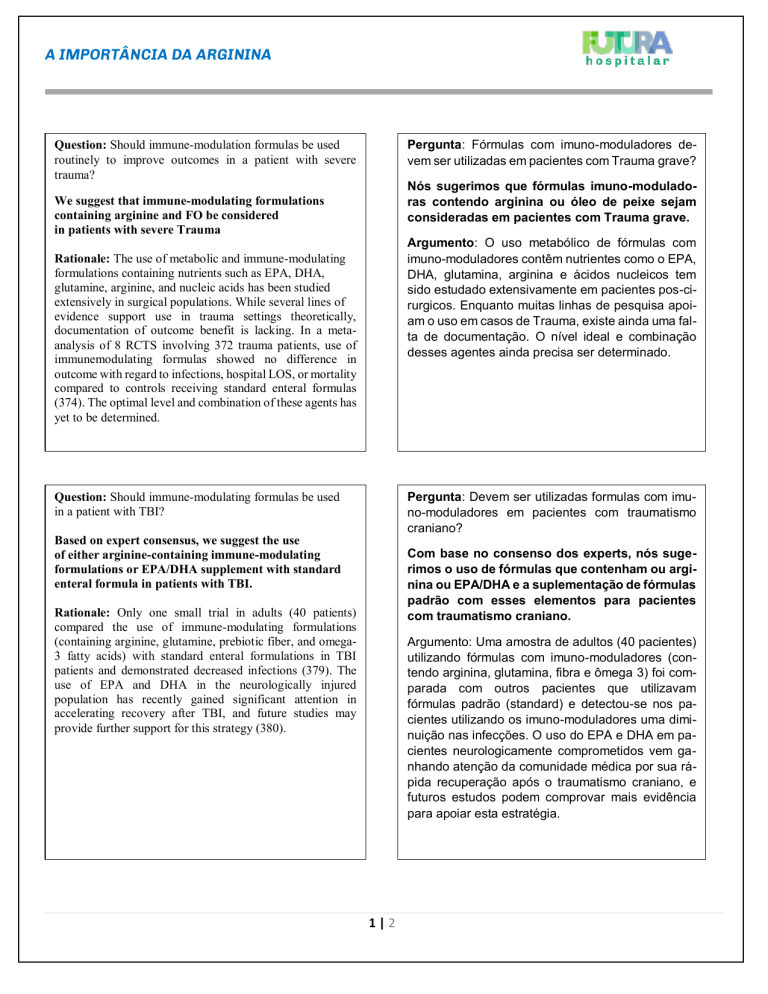
Pergunta: Fórmulas com imuno-moduladores devem ser utilizadas em pacientes com Trauma grave?
Question: Should immune-modulation formulas be used
routinely to improve outcomes in a patient with severe
trauma?
Nós sugerimos que fórmulas imuno-moduladoras contendo arginina ou óleo de peixe sejam
consideradas em pacientes com Trauma grave.
We suggest that immune-modulating formulations
containing arginine and FO be considered
in patients with severe Trauma
Argumento: O uso metabólico de fórmulas com
imuno-moduladores contêm nutrientes como o EPA,
DHA, glutamina, arginina e ácidos nucleicos tem
sido estudado extensivamente em pacientes pos-cirurgicos. Enquanto muitas linhas de pesquisa apoiam o uso em casos de Trauma, existe ainda uma falta de documentação. O nível ideal e combinação
desses agentes ainda precisa ser determinado.
Rationale: The use of metabolic and immune-modulating
formulations containing nutrients such as EPA, DHA,
glutamine, arginine, and nucleic acids has been studied
extensively in surgical populations. While several lines of
evidence support use in trauma settings theoretically,
documentation of outcome benefit is lacking. In a metaanalysis of 8 RCTS involving 372 trauma patients, use of
immunemodulating formulas showed no difference in
outcome with regard to infections, hospital LOS, or mortality
compared to controls receiving standard enteral formulas
(374). The optimal level and combination of these agents has
yet to be determined.
Pergunta: Devem ser utilizadas formulas com imuno-moduladores em pacientes com traumatismo
craniano?
Question: Should immune-modulating formulas be used
in a patient with TBI?
Based on expert consensus, we suggest the use
of either arginine-containing immune-modulating
formulations or EPA/DHA supplement with standard
enteral formula in patients with TBI.
Com base no consenso dos experts, nós sugerimos o uso de fórmulas que contenham ou arginina ou EPA/DHA e a suplementação de fórmulas
padrão com esses elementos para pacientes
com traumatismo craniano.
Rationale: Only one small trial in adults (40 patients)
compared the use of immune-modulating formulations
(containing arginine, glutamine, prebiotic fiber, and omega3 fatty acids) with standard enteral formulations in TBI
patients and demonstrated decreased infections (379). The
use of EPA and DHA in the neurologically injured
population has recently gained significant attention in
accelerating recovery after TBI, and future studies may
provide further support for this strategy (380).
Argumento: Uma amostra de adultos (40 pacientes)
utilizando fórmulas com imuno-moduladores (contendo arginina, glutamina, fibra e ômega 3) foi comparada com outros pacientes que utilizavam
fórmulas padrão (standard) e detectou-se nos pacientes utilizando os imuno-moduladores uma diminuição nas infecções. O uso do EPA e DHA em pacientes neurologicamente comprometidos vem ganhando atenção da comunidade médica por sua rápida recuperação após o traumatismo craniano, e
futuros estudos podem comprovar mais evidência
para apoiar esta estratégia.
1|2
Question: Is there any advantage to providing immune or
metabolic-modulating enteral formulations (arginine with
other agents, including EPA, DHA, glutamine, and nucleic
acid) in sepsis?
Pergunta: Existe alguma vantage em se oferecer
dietas enterais com imuno-moduladores (arginina e
outros agentes – Epa, DHA, glutamine, ácido
nucleico) para o paciente com SEPSE?
We suggest that immune-modulating formulas
not be used routinely in patients with severe sepsis.
Nós sugerimos que dietas com imuno-moduladores não sejam utilizadas ROTINEIRAMENTE
em pacientes com SEPSE GRAVE.
Rationale: Theoretically, use of arginine may pose a
threat to the septic critically ill patient who is
hemodynamically unstable by upregulating inducible nitric
oxide synthase enzyme activity, increasing nitric oxide
production, and causing greater hemodynamic instability
and organ dysfunction (418). Several clinical trials in which
arginine was supplied to septic patients reported no such
adverse events (419). In fact, arginine may provide benefit
in sepsis by promoting perfusion of tissues and increasing
cardiac output.
In a multicenter RCT of 176 septic patients given a formula
containing FO, arginine and nucleic acids, mortality (17 of
89 vs 28 of 87; p < 0.5), incidence of bacteremia (7 of 89 vs
19 of 87; p = 0.01) and incidence of nosocomial infection (5
of 89 vs 17 of 87; p = 0.01) were all reduced in the study
group compared to the controls (171). The outcome benefits,
though, were seen only in patients with moderate degree of
critical illness (APACHE II scores 10–15), which limits the
broader application of these results to all patients with sepsis.
In a small RCT of 55 septic patients, Beale reported faster
recovery in organ function as assessed by the Sequential
Organ Failure Assessment, with use of an enteral
formulation of glutamine, antioxidants, trace elements and
butyrate (but no arginine) compared to use of a standard
enteral formula (160). Similarly, an RCT of septic patients
without organ dysfunction found that, when given early,
prior to severe sepsis, an immune-enhancing enteral formula
with omega-3 fatty acids, gamma-linolenic acid (GLA), and
antioxidants reduced the development of organ dysfunctions,
although it did not improve mortality or LOS (420).
However, more recent RCTs comparing immunemodulating formulas with standard EN, of which a
significant proportion of patients were septic, failed to show
clear benefit in a MICU setting (see section E2).
Argumento: Teoricamente, o uso de arginina pode
parecer uma ameaça ao paciente que apresente
SEPSE que esteja hemodinamicamente instável por
sua possibilidade de auto-inflação na produção do
óxido nítrico, o que pode vir a causar maior
instabilidade hemodinâmica e disfunção nos órgãos.
Muitos testes em que a arginina era administrada
para pacientes com SEPSE não reportaram esses
eventos adversos. De fato, a arginina pode causar
benefícios na SEPSE pelo motivo de permitir a
profusão de tecidos e melhorar o resultado cardíaco.
Em amostras específicas com pacientes (ver quadro
ao lado) notou-se que pacientes que utilizavam
fórmulas com arginina apresentaram redução de
mortalidade e infecção hospitalar. A melhora
entretanto foi observada principalmente em
pacientes que apresentavam um grau moderado de
SEPSE (APACHE II – até 15), o que limita a
aplicação desse tipo de fórmula a outros pacientes
mais graves.
Num estudo realizado com pacientes com SEPSE
que utilizavam fórmulas com arginina, todos
apresentaram recuperação no funcionamento
orgânico. Similarmente, quando administrada para
pacientes com grau médio de SEPSE, uma fórmula
enteral com imuno-moduladores (arginina, ômega 3,
etc) leva à melhora das disfunções orgânicas.
2|2

